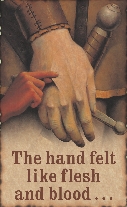Predict
Will the boy lose his fear of the strangers?
Our young men left the shelter of the trees. I—who was not yet a man—followed, crying, “Do not welcome them. Do not call them friends.”
No one listened to me, for I was but a child.
Our chief said, “We must see if they are true men.” So I took one by the hand and pinched it. The hand felt like flesh and blood, but the skin was moon to my sun.
The stranger made a funny noise with his mouth, not like talking but like the barking of a yellow dog.
Our chief said to us, “See how pale they are. No one can be that color who comes from the earth. Surely they come from the sky.”
Then he leaped before them and put his hands up, pointing to the sky, to show he understood how far they had flown.
“Perhaps they have tails,” said my older brother. “Perhaps they have no feet.”

Our young men smiled, but behind their hands so the guests would not feel bad. Then they turned around to show that they had no tails.
Our chief gave the strangers balls of cotton thread to bind them to us in friendship. He gave them spears that they might fish and not starve. He gave them gum-rubber balls for sport. He gave them parrots, too—which made our young men laugh behind their hands all over again, knowing it was our chief’s little joke, that the strangers looked like parrots.
But the strangers behaved almost like human beings, for they laughed, too, and gave in return tiny smooth balls, the color of sand and sea and sun, strung upon a thread. And they gave hollow shells with tongues that sang chunga-chunga. And they gave woven things that fit upon a man’s head and could cover a boy’s ears.